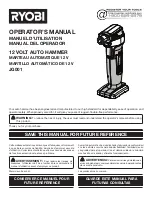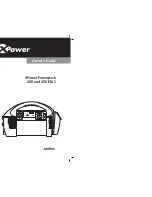
ENGLISH
31
TURNING THE DRILL MOTOR ON AND OFF
The drill motor can only be switched on when the
magnet is activated.
To turn the drill motor on, press the green button (c)
on the motor switch.
To turn the drill motor off, press the red button (b) on
the motor switch.
RE-SETTING THE MACHINE
If the power is interrupted during use, or if at any
point the magnetic seal is broken, the machine must
be reset.
1. Turn off the drill motor first, and then the
power/magnet.
2. Ensure that the work area is clean.
3. Turn on the power/magnet.
Drilling a Hole (fi g. 1)
1. Always apply an appropriate cutting
fluid/ coolant on the cutting area.
2. Lower the guard (j) so that it screens the surface
to be drilled.
3. Make sure the drill point or cutter pilot is
properly installed over the spot to be drilled.
4. Press green button (c) on the motor switch to
the start motor.
5. Slowly feed the accessory into the workpiece
using the feed handle (f).
6. At the start of the cut, apply light pressure to
allow the accessory to perform the initial groove.
7. Continue applying sufficient pressure to achieve
a smooth progressive cut. Do not force.
NOTE:
The LED indicator light (n) will flash (red)
to indicate too much pressure is being applied,
if this happens reduce the pressure being
applied until the light changes to a constant
(green).
8. Take extra care when the accessory is about to
break through the surface to prevent splintering.
9. Always turn off the motor, the magnet and the
power, in that particular order, when work is
finished and before unplugging.
OVERLOAD PROTECTION
The D
E
WALT magnetic drill is fitted with an overload
protection feature to prevent damage to the motor if
excessive loads are applied during operation.
The LED indicator light (n) will flash as a warning
that excessive load is being applied, if this happens
reduce the pressure being applied until the light
changes to a constant green. If pressure is not
reduced the overload protection will activate by
cutting power, at which point the LED will be a
constant red. To reset the tool from this state, run
the unit at no load for several seconds. This allows
the motor to cool before resuming the drilling
operation.
Drilling with Annular Cutters
Annular cutters only cut material at the periphery of
the hole, rather than converting the entire hole to
shavings. As a result, the energy required to make a
hole is lower than for a twist drill.
When drilling with an annular cutter, it is not
necessary to drill a pilot hole.
WARNING:
Do not touch the cutter or
the parts close to the cutter immediately
after operation, as they may be
extremely hot and cause burns to the
skin.
Ensure nobody is in the work area
where the metal core is ejected.
Drilling Conditions
The ease with which material can be drilled depends
on several factors including tensile strength and
abrasion resistance. Whilst hardness and/or strength
is the usual criterion, wide variations in machineability
can exist among material showing similar physical
properties.
The drilling conditions are dependent on
requirements for tool life and surface finish. These
conditions are further restricted by the rigidity of the
tool and the workpiece, lubrication and machine
power available. The harder the material, the lower
the cutting speed.
Some materials of low hardness contain abrasive
substances leading to rapid cutting edge wear at
high speeds. Feed rates are governed by rigidity of
set-up, volume of material to be removed, surface
finish and available machine power.
MAINTENANCE
Your D
E
WALT power tool has been designed to
operate over a long period of time with a minimum
of maintenance. Continuous satisfactory operation
depends upon proper tool care and regular cleaning.
WARNING: To reduce the risk of
injury, turn unit off and disconnect
machine from power source before
installing and removing accessories,
before adjusting or changing
set- ups or when making repairs.
Be
sure the switch is in the OFF position.
An accidental start-up can cause injury.
















































